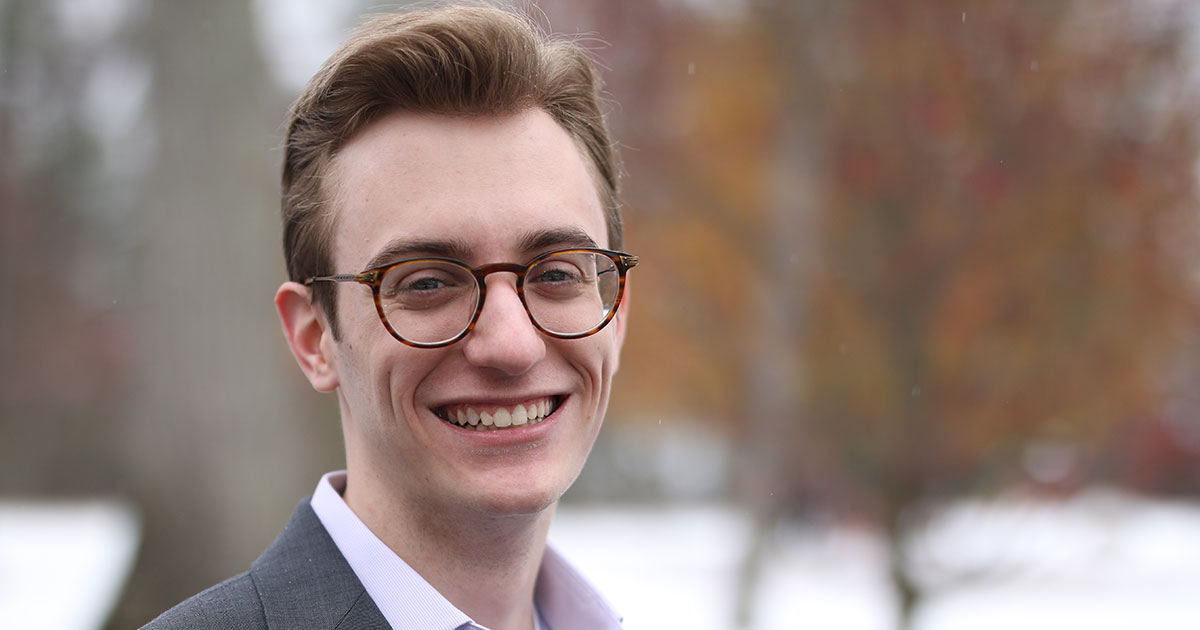Life and Business After ePitch

The weekend of September 20 was a big moment for Babson. Babson’s Centennial Celebration was in full force. And at the center of it all was Babson ePitch: Second Century Challenge, where three finalists would compete for upward of $100,000 at Babson’s biggest pitch competition yet.
Ryan Laverty ’20 found himself—along with fellow students Michael Ioffe ’21 and Maxine Anderson ’22, three recent Summer Venture Program alumni, and Joe Passanante—about to take the stage to present their startup, Arist, a text message learning platform.
During their presentation, judge Tim Chae, general partner of 500 Startups, asked Laverty and his team, “Are you guys going to be dropping out and pursue this full time if you guys get the funding?”
After a slightly awkward hush in the crowd, Laverty responded, “We get this question a lot. I don’t doubt the narrative for the average college student that college is an inhibitor to the business . . . but for us, we’ve found Babson to be more of a catalyst for the business than anything else.”
After that unforgettable moment at ePitch, we were able to catch up with Laverty and asked about his experience at Babson and future career plans.
Why did you choose Babson?
Ever since I was young, I was always fascinated by entrepreneurship. In middle school, I remember buying and selling cameras, toys, etc., on eBay. When I was in high school, I would import things through Alibaba and sell them online. When it came time to look for a school, the idea of a school where students running companies wasn’t just allowed, but encouraged, had my attention.
If you could change one thing in the world, what would it be?
If I could change one thing in the world, it would be the systems we’ve built out to educate large populations. This is because of the impact that education would have on most of the world. Hedge funds and the S&P can return anywhere from 7[%] to 10% historically, but most people around the world can’t invest in these. Education, on the other hand, has a return of 15%. This means that for the average person around the world, education is the greatest return on investment they’ll ever make. Education’s two fundamental problems, though, are the access to it and lack of lifelong engagement in it. Most learning is done in our formative years of life, and we later fail to evolve and learn as the world around us does. Systems that encourage lifelong learning that can happen alongside a workforce, rather than as a predecessor to joining a workforce, will drastically change the world.
What student organizations are you involved in at Babson and how have they impacted your Babson experience?
I serve on the board of advisors and am a resident of eTower, where I served as president for 2018. This was incredibly formative to my business expertise and taught me how to build amazing communities and teams of people. There were times when I was under an immense amount of pressure and had to manage many people under strict deadlines. I learned how to be calm under pressure, make good decisions, lead well, and above all else invest time in people first. I am also a brother of Alpha Kappa Psi, a professional fraternity on campus, and the friends I’ve made and skills I’ve built through it will stick with me for life.
How do your activities outside of the classroom influence your academic pursuits and career plans?
Outside of the classroom, most of my time is spent on Arist, the first text message learning platform. Arist was started by some fellow Babson students and I about a year ago to help create a better way for the world to learn. Running Arist has taught me a lot about all things fundraising, teamwork, and solving complex problems. This has very directly impacted my career plans, since I plan to run Arist full time after school. At Babson, I’ve taken advantage of many entrepreneurship classes and professor office hours. Many startups and programs have helped me to bring Arist to the next level, and I’ll often meet with professors for strategic advice and introductions.
What are your professional goals?
My immediate professional goals are to run my own startup and build a great team. I believe that entrepreneurship is one of the fastest ways to learn a wide skill set, because of the high level of pressure and self-reliance for problem solving. One day, I’d love to run my own incubator or accelerator to help up-and-coming entrepreneurs. My time running eTower taught me a lot about how to best support new founders, and I find most founders face the same problems. This is why it’s crucial to have communities for support, and I would love to build one of those communities.
Posted in Community






